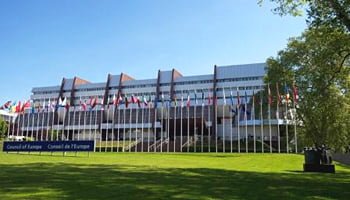
CoE Issues 26th Report on Conflict in Georgia
The Council of Europe (CoE) issued the Secretary General’s 26th consolidated report on the conflict in Georgia, reviewing the security and human rights situation in the Russian-occupied Abkhazia and Tskhinvali region/South Ossetia for the period between April-October 2022.
According to the document, during the reporting period, Georgian authorities continued to raise concerns over the “borderization” trend occurring along the dividing line, including as regards to illegal detentions and unresolved cases, which “contributes to the escalation of the situation on the ground and represents a further impediment and violation of the freedom of movement.”
In that context, the report highlighted that the humanitarian and human rights situation on the ground is affected by restrictions on freedom of movement, documentation issues, and obstacles to accessing basic services. Notably, while acknowledging that openings of crossing points were observed in the reporting period, the document emphasized that the openings continued to be affected by document-related obstacles.
The report noted that no progress had been achieved on the investigation demanded by Georgian authorities into the deaths of Giga Otkhozoria, Archil Tatunashvili, David Basharuli, Irakli Kvaratskhelia, and Inal Jabiev. It also highlighted that no progress has been made on the issue of internally displaced persons’ return to their homes in the occupied regions.
In humanitarian efforts, the report said the United Nations High Commissioner for Refugees (UNHCR), the United Nations Development Programme (UNDP) the World Health Organization (WHO), and the International Committee of the Red Cross (ICRC) continued to engage with most vulnerable segments of Abkhaz populace, including by providing financial and food assistance.
Situation in Abkhazia
The document reported that illegal “borderization” activities continued along the Abkhazia dividing line, including the “extension of fences, the installation of new surveillance equipment, and increased monitoring around ‘crossing points.'”
Illegal detentions also persisted, with 5 people detained in March-September 2022, according to the document. In that context, the report drew attention to the health situation of Irakli Bebua, as well as the illegal detention of Kristine Takalandze on espionage charges in July 2022.
- 08/11/2022 – SSG: Georgian Citizen Detained in Occupied Abkhazia
Per the report, overall, the need for so-called “residence permits” for persons living in the ethnic Georgian majority Gali district continued to have implications for freedom of movement for those wishing to cross into Tbilisi-controlled territory.
Regarding education, the CoE report said that an hour each is devoted to the Georgian language and literature per week at schools of the ethnic Georgian majority Gali district, with courses mainly taught in Russian. It recalled that receiving education in the Georgian language has been banned in both schools and kindergartens in the district.
The CoE also reported that Gali Incident Prevention and Response Mechanisms (IPRM) meetings have remained suspended throughout the period of review.
- 18/10/2022 – Sokhumi Hints at Resuming Gali IPRM
The report drew attention to the agreement signed between Russia and occupied Abkhazia on dual citizenship in September, which will launch a mechanism for Abkhazians to obtain Russian citizenship without giving up their Abkhaz passport.
Situation in Tskhinvali region/S. Ossetia
The report noted that Tbilisi raised concerns about ongoing “borderization.” Citing the Georgian government’s data, they reported that in January-September 2022, 51 cases of such activities were recorded, including the installation/reinforcement of observation posts, new fencing, and border signs.
Also citing the Georgian government, the document said that in March-September 2022, the Russian occupying forces arbitrarily detained 29 people.
While noting that there were no further incursions in the Chorchana-Tsnelisi area, the report stressed that “the situation, nevertheless, remained unresolved and conducive to tensions with the presence of armed units and the continued construction of new positions on site.”
Notably, the report emphasized that “no positive trends” were observed in reference to the humanitarian situation in the region, especially in the Akhalgori district, where there are “dire socio-economic circumstances.” In fact, the “negative impacts” from the extended closure of crossing points continued to limit the entry of goods and food, while hampering access to pensions and other social benefits in Tbilisi-controlled territory.
Such restrictions also affected access to medical care, as well as the supply of medicine provisions and equipment.
The report did note that during the three Ergneti IPRM meetings held during the reporting period, the co-facilitators commended the release of detainees while calling for a humanitarian approach to all current and future detention cases. They also welcomed the temporary opening of crossing points during the Lomisoba religious celebrations, and on a more regular basis in late August.
The CoE document took note of the International Criminal Court’s Prosecutor filing an application for the arrest warrants for three people from the de facto authorities of the South Ossetia/Tskhinvali region on March 10, 2022.
Also Read:
- 06/05/2022 – CoE Issues 25th Report on Conflict in Georgia
- CoE Issues 24th Report on Conflict in Georgia
This post is also available in: ქართული Русский